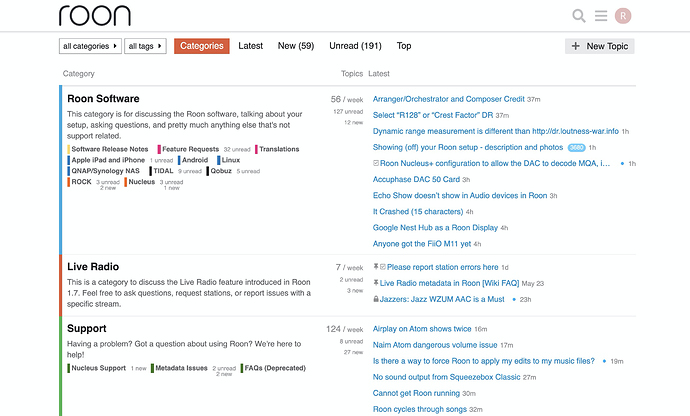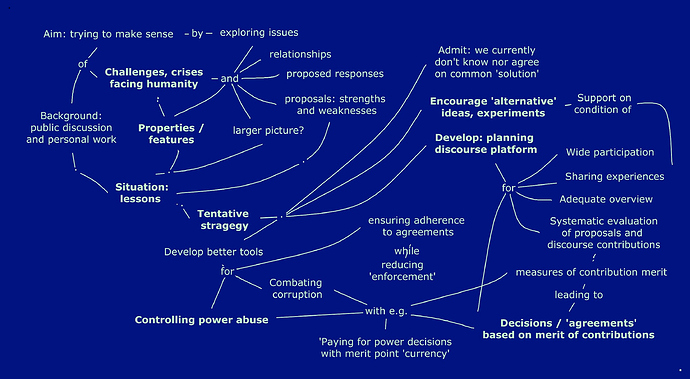A tentative strategy
For facing humanity’s challenges
Thorbjørn Mann, July 2020
Aim
An effort to explore, understand and convey some thoughts
about humanity’s current challenges and proposal for
what might be done about them
including how some of the issues I have been working on
might fit into that larger picture – for example:
- a global participatory ‘planning discourse platform’
- with better evaluation of discourse contributions
- leading to better decisions / agreements
based on the merit of discourse contributions
- avoiding some obstacles to implementation and governance
Overview
Background
-
Emerging awareness of crises and challenges to humanity survival, as expressed e.g. by UN Secretary General Ban Ki Moon call for “revolutionary thinking and action to ensure an economic model for survival” (World Economic Forum 2011);
-
A ~9000 post LinkedIn discussion (Systems Thinking World) page, challenging ‘Systems Thinkers’ to respond to the call;
-
The discussion did not lead to any single definitive answer or agreement, but offered many interesting insights and lessons;
-
Some of my writing on design and planning methods, assess-ment of planning arguments, the value of built environment as a function on ‘occasion’ and image seemed to relate to these issues and merge into a tentative strategy for discussion.
Approach
This effort should be seen as an exploration of the issues and their relationships, raising questions more than suggesting definitive answers -- but considering the questions as urgent.
Trying to distill the key elements of a tentative strategy for finding better answers and achieving the agreements needed for effective and coordinated global responses to the crises;
Encouraging a critical attitude to the comments – on every page there should be two brief reminders to consider: “Wrong question, wrong way of looking at the problem?” And “Missing aspects?”, inviting readers to add their views on the issues.
CRISES, CHALLENGES:
A collection of examples, in no particular order:
Climate change Armed conflicts (war) Crime
Earthquakes Flooding Drought, Storms
Pollution:
Air, Groundwater, Oceans, Rivers, lakes Space
Forest fires Soil erosion Tsunamis
Shortages: Food Water Housing/Shelter Energy
Health care: Epidemics Drugs, Access, Insurance
Education Information Censorship
Financial system breakdowns Poverty Inflation
Inequality Corruption Political conflicts
Species extinction Racism Religious conflicts
Discrimination: Gender, Ethnic, economic background, Age
Unemployment Working conditions Wages
Industrial accidents Resources depletion
Political ideologies Fascism Authoritarianism
Insights and observations:
-
There is wide agreement that challenges – local and global – are real, serious and urgent; and that changes are called for;
-
Already, many proposed ideas, theories, models, experiments, initiatives, already are underway, to meet the challenges;
-
These ‘alternative’ initiatives are creative and diverse but sometimes based on contradictory premises and principles;
-
There is little cooperative communication between these efforts;
-
There is no emerging agreement about a definitive ‘model’ or a coherent strategy for implementation
-
Current governance models appear inappropriate / incapable for effective response to the crises.
Examples of suggested responses: (in no particular order):
- ‘Unified’ acceptance of existing (improved?) positions;
- Overthrowing the current system: introducing a ‘New System’
- General adoption of new ‘thinking’ (e.g. ‘Systems Thinking’) and innovation practices;
- Resisting Big Government, Returning to ‘Small Governance’, ‘Sociocracy’, ‘Holacarcy’, improved social democracy forms;
- General adoption of ‘Commons’ economy;
- Promotion of mental attitudes: “Awareness”; ‘We not Me”;
- Returning / general adoption of religious / moral principles;
religion-based governance;
- Intensified adoption of technology; e.g. Artificial Intelligence;
‘renewable’ energy sources, recycling,
- Intensified citizen participation in planning and governance;
- Adoption of permaculture, regenerative agriculture practices;
- Abandoning use of fossil fuel for energy generation;
- Abandoning logging destruction of rainforests, desert reforestation
- Basic Income Guarantees / Universal Basic Income;
- and more…
My related work and suggestions
Work, teaching and writing on
-
Design methods and theories –e.g. the role of occasion opportunities and image of built environments; (related to built environment role in quality of life measures): Building Economics and Value of Built Environment as a function of occasion and image;
-
‘Argumentative planning Information systems’ (after Rittel)
-
Structure and Evaluation of Planning Arguments
-
Development of a (potentially global) planning discourse support platform aiming at planning decisions based on the merit of discourse contributions;
-
Suggestions for encouraging experiments of ‘alternative’ innovative approaches, experiments in areas where existing systems have been destroyed by natural or man-made disasters.
Some common shortcomings of suggested ‘solutions’:
-
Many ‘single-aspect’ proposals;
-
‘Consulting brand’ solutions aimed at ‘clients’ in competitive environments (rather than global cooperation);
-
Incompatible basic principles and theories;
-
Techniques for small groups of selected client employed participants;
-
‘Remedial’ events led by outside (consultant) facilitators producing recommendations to actual decision-makers;
-
Suggestions ranging from specific situation remedies to general ‘awareness’, ‘holistic’ admonitions w/o implementation details;
-
Assuming ‘general goodwill’ as basis for cooperation; neglecting key ‘negative’ factors: competition, power, deteriorating distrust in current governance, desire for ‘making a difference’.
What to do?
-
No general agreement on overall policy / action in sight
but a strong sense that ‘Something must be done’: calling for
a preparatory tentative strategy?
-
Encourage / support the continued development of many small / local experiments, initiatives, ideas, ‘models for survival’ –
on condition of
sharing experiences (successes, obstacles, failures)
(not just promotional material)
in a common, potentially global
-
Development of a ‘Planning Discourse Support Platform’
for
systematic analysis, discussion, evaluation of proposals
and common ‘rules of the road’ decisions / agreements
based on measures of merit of discourse contributions.
Supporting ‘alternative’ efforts / ideas
-
Constructive use of creativity, better knowledge of local conditions, tested effectiveness of small group cooperation and decision-making practices as well as people’s desire to ‘make a difference’ – ‘their’ solutions;
-
Tolerating apparently incompatible principles, theories, (on condition of mutual non-obstruction) in exchange for gaining knowledge of ‘what works, what doesn’t work’;
-
Insisting on honest sharing of experience, information, tools, techniques; and cooperation on needed common ‘rules of the road’ agreements;
-
E.g. encouraging ‘alternative’ experiments: “Innovation Zones” n areas destroyed by natural or man-made disasters (using ‘disaster aid’ for innovation instead of reconstruction of old, possibly obsolete infrastructure).
Development of a Planning Discourse Support Platform
Purpose (for both small-scale, local as well as ‘global’ use):
-
Sharing proposals and information, experiences, for analysis, discussion, evaluation and possible general adoption;
-
Encourage wide participation of affected parties (rewarding discourse contributions according to their merit & originality);
-
Developing measures of discourse contribution merit;
-
Developing decision modes based on the merit of discourse contributions (rather than mere possibly poorly informed or partisan votes, corruption, or authoritarian power);
-
Developing better tools to combat obstacles to effective responses: corruption, power abuse, violence, influence of money, lack of valid information, training, competence.
Desirable platform features:
-
Easy access, incentives for participation, cooperation;
-
Acceptance of all frames of reference (mental models) as starting points for discourse (no dominant ‘thinking’ brand);
-
Translation: both natural language to natural language, and scientific / technical ‘jargon’ to conversational language;
-
Acceptance of all contributions but only ‘first’ (original) entries to be rewarded and shown in overview and decision displays;
-
Governance, funding, operation as independent from powerful economic / financial or (competitive, power-or dominance motivated) nationalist influence as possible;
-
Flexible, open to continuous innovation and local adaptation, avoiding aging into obsolete bureaucratic ‘fossil’ structure.
Key aspects of evaluation in the discourse:
-
Evaluation / judgments present and needed in all phases of the decision-making process (usually not well coordinated)
-
Evaluation tasks:
- Assessment of ‘problem’ situation: ‘IS-state’
As compared to desired / expected ‘OUGHT-state
- Assessment of expected effectiveness of plan / policy
- Evaluation of merit of discourse contributions: problems,
information (data), proposals, tools / approach, questions, arguments pro/con, evaluation judgments
- Assessment of adequacy of evidence and support for claims, proposals (depth, breadth validity), judgment basis;
- Assessment of adequacy of ‘aggregation’ tools
both individual partial to overall judgments and individual to ‘group judgment’ statistics
- Assessment of degree of agreements of different parties’ evaluation results;
- Assessment of role of feelings, non-quantifiable aspects
Platform Structure: Components
-
Public information component (announcing discourse issues)
-
Portal for public entries via different media;
-
Display of proposed issue ‘candidates’ for discussion
-
Display of procedural agreements (‘rules of order’)
-
Selection / decision for acceptance on platform agenda
-
Record of entries (‘Verbatim’) file
-
Entry reward mechanism (basic participation reward
to be evaluated later);
-
Display of Proposals being discussed (“On Agenda”)
-
Support provisions: Data search, AI analysis, ‘Tool kit’;
-
Sorting / directing entries into appropriate topic;
-
Preparation of Evaluation worksheets
-
Collection, calculation and display of assessment results;
-
Displays of discourse status and results (Overview)
Modification of participants’ contribution merit rewards, as
derived from overall group evaluation scores;
-
Record / log of procedure, decision results: Archive.
Platform: Discourse Process / Procedure
-
‘Raising issues’
-
Displaying discussion ‘issue candidates’
-
Preliminary (unstructured) comments: these determine
-
Acceptance/rejection on agenda for
systematic discussion and evaluation
-
Display of accepted ‘Topics’ / Proposals, Issues.
-
Entering questions, information, arguments
-
Displays of evolving discourse in structured format,
interim decisions, evaluation;
-
Motion for determining ‘Next Step’: e.g.:
- Back for more information, modification of proposal;
- Proceed to structured evaluation;
- Proceed to application of ‘special technique’ (in ‘toolkit’)
(Return to ‘Next step’ after each of these activities)
- Proceed to decision
- Drop issue (without decision)
- Stop / Close discourse: prepare summary / log entry.
Use of discourse ‘by-products’ – e.g. ‘merit points’:
-
Each discourse contribution entry earns a ‘basic contribution’ acknowledgement token;
-
If the item is a ‘first’, original (not duplicated or repeated) content, the basic, ‘empty’ point will be increased or decreased according to the group’s plausibility or quality/significance assessment during the proposal evaluation;
-
Participants will build up a merit points ‘account’ (itself an incentive for participation);
-
The account can be used as part of a person’s qualification record for public office (or private employment);
-
A person in position empowered to make decisions that can’t wait for public discussion outcome ‘pay’ for each decision with an amount of merit points, according to the decision’s significance: ‘Paying for power’. Investing reputation, not $, for returns according to success;
-
Citizens may transfer some of their own merit points to an official as support for the official’s power to make specific decisions. This makes supporters equally ‘accountable’ for those decisions.
-
If the account is depleted, the person cannot make any more decisions: a partial form of control of power.
What’s missing?
The global platform must be online, of course.
But it must also convey life:
We need real places for the local experience of that discourse
Places where people get together
To discuss their problems, needs, and strife
Where the singer, the poet, the storyteller
Can give form and color to their vision and dreams
Where moments of joy to remember can happen:
“That’s where WE made Our Future. Our life.”
And those places, too, must be designed.




